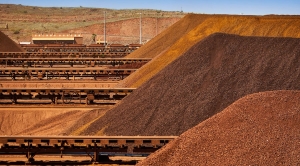


(Posted on 29/11/22)
Rio Tinto has proven the effectiveness of its low-carbon iron-making process using ores from its mines in Australia in a small-scale pilot plant in Germany, and is now planning the development of a larger-scale pilot plant to further assess its potential to help decarbonise the steel value chain.
The process, known as BioIron, uses raw biomass instead of metallurgical coal as a reductant and microwave energy to convert Pilbara iron ore to metallic iron in the steelmaking process. BioIron™ has the potential to support near-zero CO2 steel-making, and can result in net negative emissions if linked with carbon capture and storage.
Over the past 18 months, the process has been tested extensively in Germany by a project team from Rio Tinto, sustainable technology company Metso Outotec, and the University of Nottingham’s Microwave Process Engineering Group. Development work was conducted in a small-scale pilot plant using batches of 1,000 golf ball-sized iron ore and biomass briquettes.
Rio Tinto Chief Commercial Officer, Alf Barrios, said “Finding low-carbon solutions for iron and steelmaking is critical for the world as we tackle the challenges of climate change. Proving BioIron works at this scale is an exciting development given the implications it could have for global decarbonisation.
“The results from this initial testing phase show great promise and demonstrate that the BioIron process is well suited to Pilbara iron ore fines. BioIron is just one of the pathways we are developing in our decarbonisation work with our customers, universities and industry to reduce carbon emissions right across the steel value chain.”
BioIron™’s potential was confirmed in a comprehensive and independent technical review by Hatch, the global engineering, project management and professional services firm. Hatch noted the thorough work completed by the team and BioIron™’s capacity to reduce greenhouse gas emissions while converting Pilbara iron ore into iron and steel.
The BioIron™ process will now be tested on a larger scale, at a specially designed continuous pilot plant with a capacity of one tonne per hour. The design of the pilot plant is underway and Rio Tinto is considering suitable locations for its construction.
The BioIron™ process works using lignocellulosic biomass including agricultural by-products (e.g. wheat straw, canola stalks, barley straw, sugar cane bagasse) or purpose-grown crops. The biomass is blended with iron ore and heated by a combination of combusting gases released by the biomass and high-efficiency microwaves that can be powered by renewable energy.
Rio Tinto is aware of the complexities around the use of biomass supply and is working to ensure only sustainable sources of biomass are used. Accordingly, the company is undertaking a benchmarking study of biomass certification processes. Through discussions with environmental groups, as a first step Rio Tinto have ruled out sources that support the logging of old growth and High Conservation Value forests.
Steelmaking accounts for 8 percent of the world’s carbon emissions, and 66 percent of Rio Tinto’s Scope 3 emissions.
The BioIron™ process is well suited to Pilbara iron ore fines and is a highly efficient use of biomass as it is primarily used as a reductant, with microwave energy driving the iron ore reduction reactions to remove the oxygen from the iron ore.
The National Grain and Feed Association (NGFA) has applauded Senator Deb. Fischer’s (R-Neb.) reintroduction... Read more
Anglo American plc and Teck Resources Limited have received regulatory approval from the Government... Read more
The Rhodes Ridge Joint Venture has approved a $191 million (A$294 million) (Rio Tinto share $96 million... Read more
Trafigura Group Pte Ltd, a global leader in the commodities industry, has announced its financial results... Read more
Rio Tinto has successfully produced the first copper from the Johnson Camp mine in Arizona using its... Read more
The American Soybean Association’s World Initiative for Soy in Human Health programme and the... Read more
Karlka Nyiyaparli Aboriginal Corporation (KNAC) Registered Native Title Body Corporate and Rio Tinto... Read more
OCI Global, a leading global producer and distributor of nitrogen products has announced that it has... Read more
In December 2024, SSAB was granted a permit by the Land and Environment Court at Umeå District... Read more
The President of the Republic of Guinea has joined project partners WCS1, Baowu, Chinalco and Rio Tinto... Read more